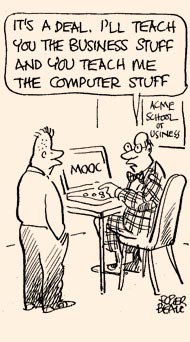Business school professors face an uncertain future
Roula Khalaf, Editor of the FT, selects her favourite stories in this weekly newsletter.
Massive open online courses (Moocs) threaten the existing business school model and that includes many professors in the classroom. The arrival of Moocs will make 60-70 per cent of existing business school teaching faculty either superfluous or unprepared in the next five years in terms of their skills and mindset.
The teaching faculty most vulnerable to the advance of Moocs will be those teaching core MBA concepts – theory, frameworks and empirical evidence – in the classroom, those who cannot or will not integrate online material into their courses, and those who are unable or unwilling to collaborate with clients and fellow professors. The most vulnerable schools will be traditional institutions with tenure systems, who will find it harder to adapt quickly.
Moocs are changing the face of business school education. They are already replacing some existing classes on fundamental core concepts such as accounting. Writing in the New York Times recently, journalist and author Thomas Friedman reported that Harvard Business School no longer teaches entry-level accounting; rather, its students take an online course from an external accounting professor because it is “just so good”.
Those business schools that have invested heavily in teaching basic MBA concepts in the classroom could soon find themselves with 50-60 per cent too many professors. Business schools that have a tenure system – whereby teaching staff who have excelled in publishing academic peer-reviewed journal articles are guaranteed a position until their retirement – will have a particular headache, because it could take 30 years to eliminate their excess capacity and until their final tenured professor retires or leaves.

As Moocs become more prevalent they will increasingly complement other programmes. For example, students might be required to complete some online courses before beginning the first year of their MBA programme and to take other Moocs as electives during the second year.
Such a complementary model will require skills that many existing staff simply do not have. Professors will find that they increasingly need to engage in the classroom with participants who have already taken online courses as part of the programme. This means business schools will need staff who not only know their field intimately but can also apply all content – online, their own and traditional – to ambiguous, uncertain, real-world business problems. The value added of the professor here shifts from teaching content to facilitating sophisticated, context-relevant applications of theories and frameworks to messy business challenges.
In the classroom, this could mean applying theory and frameworks to existing cases, participants’ own business challenges and/or experiential exercises. Such context specific applications will become much more important than a professor broadcasting his or her field of knowledge. Business schools will pay a premium for those faculty who are familiar with the real and online world, who can create intense discussions in class, help students relate all content, including online, to real issues and help students learn from both them and each other. Professors must excel at guiding discussions with programme participants that explore the different possible solutions to assignments. There will often be no easy answers.
Finally, Moocs will also contribute to a bigger part of business schools’ customised in-house programmes for companies – enabling these schools to reach more managers and reduce the amount of time that these executives will need to spend on a campus. In turn this will call for teachers who have a collaborative mindset. They will need to engage with clients to understand their organisations’ strategies and learning needs, as well as with their faculty colleagues to make sure that the clients’ needs are met. The demands on teaching staff to develop new skills multiply in this context. For example, The Chronicle of Higher Education, the newspaper and website, surveyed professors who have developed online course material. It found that professors spent up to 100 hours producing and honing their content, followed by a significant amount of time in online discussions.
This teaching style of the future contrasts starkly with traditional business schools today. Currently professors research their subject in depth and publish in top journals to become tenured. What matters is the one-way transmission of knowledge with its “the answer is . . .” mindset. In the future although “thought leadership” will still be important, professors will need to change the way they work. Traditional schools will have to convince tenured staff to adapt to the new Moocs environment with its focus on integrated teaching. And because of the constraints of tenure, these schools must change the skills of their existing professors rather than hire new ones.
Those independent business schools without tenure systems in place are nimbler and more flexible, and will adapt better to the Moocs challenge. They can and must adapt their teaching faculty hiring criteria to provide their clients with the most value.
The technological storm is a threat to the current business school model and professors must adapt if they are to avoid the endangered species list.
Robert Hooijberg, Anand Narasimhan and Nancy Lane. Robert Hooijberg and Anand Narasimhan are professors of organisational behaviour at IMD. Nancy Lane is a research associate at IMD
Comments